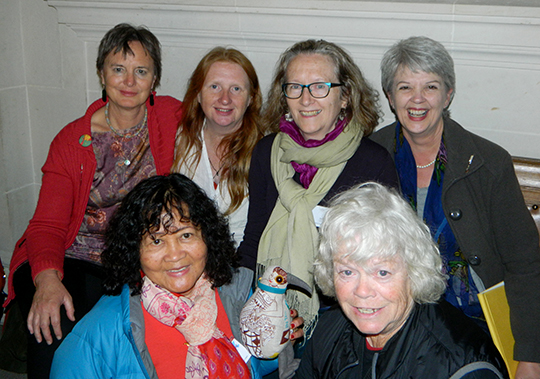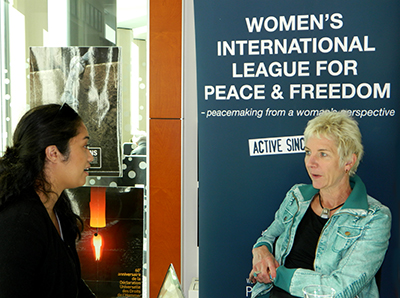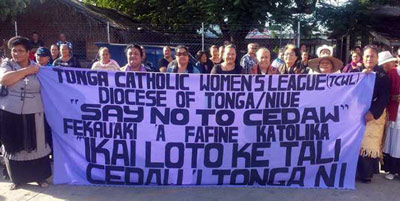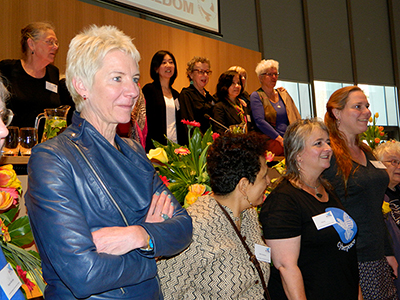
Alistar Kata
AUCKLAND (Pacific Media Watch): A group of 1000 women peace activists gathered at a conference in the Netherlands for the Women's International League for Peace and Freedom's (WILPF) centennial anniversary conference to share experience and insights.
The conference, themed "Women's Power to Stop War", allowed women from conflict zones to share their experiences calling on a new movement for change.
WILPF secertary-general Madeleine Rees says one of the main discussions focused on finding the "entry points" for women to bring change to the ways in which conflict happens.
“One of the ways in which women can use their power to stop war is by engaging with men to change that dynamic,” she told Pacific Media Watch in Auckland this week.
“It is for us to help to shine the light, if you like, on the work that men are doing which is non-violent, and to make the heroes the men who stand up against domestic violence and actually do something about it."
Rees said highligting alternative views of masculinity is important so men become "comfortable not having that hyper-masculine alpha male".
But she also said change "starts with ourselves".
Think globally, act locally
Rees said the point of the conference was not to make demands of governments and bodies like the United Nations, but to start building "a real integrated movement for change".
“We were calling on ourselves, what are we going to do to make those changes? How are we going to work together to get the shift in the whole system we want?,” she said.
"Change starts on a grassroots level, we said it starts with yourself”.
Rees said another entry point for women to stop war was to become part of the peacemaking processes.
“We decided at the end of our conference that of course women do have the power to stop war because we’re the ones that are in everything. We’re the ones that are in the families, we have the kids, it is women who run the communities more than men,” she said.
She said women are ignored and left out of the peace making processes, but they are the ones doing the “grassroots” work.
“There is the perception that women have no role to play in war because war is a man’s game.”
'Far less sexy'
She said the perception of what women were doing is “far less sexy”.
One of the delegates for WILPF Aotearoa, Del Abcede, said women in the Pacific were already starting to be part of the peacemaking processes.
"Some of them are really using their opportunities, for example, in Bougainville and also in Fiji, they have the Fiji Women's Crisis Centre and they are speaking out", she said.
"Unless women put forward their voices and be more proactive, there might be a change, but it's very very slow."
Abcede, who attended the conference, said women needed to be more proactive, to enhance the process of change and help in solving the problem "much faster and more effectively".
Rees said research showed women were needed to make peace sustainable.
"If you have women participating in the peace process, from beginning to end, bringing solutions to the table, you will have sustainable peace”.
Gender equality
But both Rees and Abcede believe the main challenge for women is equality.
Rees said women were dealing with patriarchal systems.
"If you look at the United Nations, for example, it has a culture of hegemonic masculinity and its extraordinarily difficult to get that turned around because there is a way of doing things that they have always done," she said.
"It is a culture of, you’ve got to be part of it, or you’re out - and that is what has got to change”.
Rees said more women in power positions were needed, but the right type of women.
“We’ve got to have women who are prepared to make those changes, not the ones who are just going to be included into something which is actually not working”.
Abcede said it was important to remember that some countries were matriarchal before colonisation.
"In Bougainville, its the matrilineal line that decides who inherits the land," she said.
"Its remebering that half of the world's population are women, so we should not always look at the men as the leading role".
Combatting traditions
According to Abcede, it is "challenging" for women in regions where religion and tradition take precedence and some traditions allow men to be the "patriarch" with the attitude that "no one can break me".
"This is one thing that slowly has to be broken in a way that is acceptable to the whole community," she said.
"Unless the community accepts it, then there will be no change".
Rees said in areas where Western values were not common, there was a danger of people rejecting change, with the view that Western values were being imposed on to their communities.
But Rees said that was not the case.
"It’s not, it’s absolutely not, because those are shared values”.
She said part of the difficulty why conventions, like CEDAW (Convention on the Elimination of all forms of Discrimination Against Women), were not more widely accepted was “fear”.
"It is the idea that it’s going to destroy our culture, we’ve been like this for centuries and we don’t want change,” she said.
Protesters from churches in Tonga marched to the Palace office last week in opposition to CEDAW being ratified in their country.
But according to Rees, these tools should be embraced because they would help change over time and recognise the good that is already happening.
Abcede said the key to educating women in the Asia-Pacific region was to get women who have the "mana" (authority and respect) in regions to talk to their peers.
"Otherwise you just go in there and they say, 'who are you?".
Media is instrumental
Another tool in pushing the peace movement forward was the use of media.
Rees said media were active in creating a “climate of fear” in places where militarisation took place.
She said reporting on how you could prevent war was "not sexy".
"Talking up and inflaming the situations gets your readers a much more exciting narrative”.
Abcede said journalists needed to be more aware of what was happening on a "grassroots" level.
"It would be nice if media go to places and find out for themselves, instead of interpreting," she said.
"For a start, the interpretation is wrong and then they are multiplying the wrong, creating a myth".
Moving forward
Rees acknowledges it is becoming increasingly difficult for women to be activists these days, but by "sharing" experiences, the women's peace movement can move forward.
“You get that much more by talking with other women because there is a congruity within those arguments because everybody is going through the same thing", she said.
“Everybody’s got their own piece to the jigsaw puzzle. Bring your piece to the table and join it up with everybody else and that way, we’ve got a real movement for change”.
This work is licensed under a Creative Commons Attribution-NonCommercial 3.0 New Zealand Licence.




